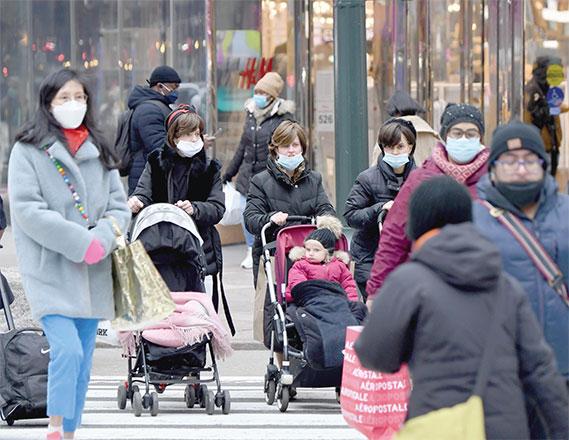- International News
- Thu-2021-01-07 | 03:58 pm

England went back into full lockdown as Europe battled Wednesday to stem a rising tide of coronavirus cases, and the United States logged its worst daily death toll of the pandemic.
The COVID-19 crisis has shown no signs of slowing, with known infections nearing 86 million worldwide and more than 1.8 million deaths, even as many nations ramp up their vaccination rollouts.
England began its third national lockdown Tuesday as alarm grew in Britain over the latest surge in cases which is threatening to overwhelm its National Health Service, piling on the misery for people growing tired of social distancing and the economic cost.
"It's just exasperating, because I don't know if people can just go that extra mile, another six weeks with this lockdown. It's just crazy," said Alex, a 65-year-old retiree and one of the few people out on the streets of London on Tuesday.
A senior government minister has warned the lockdown could last into March.
Denmark and Germany also extended and increased coronavirus measures on Tuesday, as concerns grew about the surge on the continent and the European Union falling behind other advanced nations in its vaccination drive.
There are hopes the bloc’s medical regulator will authorise the Moderna vaccine when it reconvenes on Wednesday. It approved the Pfizer-BioNTech shot last month.
Limited supplies are a major hurdle for nations trying to accelerate their rollouts.
But World Health Organisation (WHO) experts on Tuesday gave cautious backing "in exceptional circumstances” to delaying the second doses of the Pfizer-BioNTech vaccine.
WHO chief Tedros Adhanom Ghebreyesus said he was "very disappointed” with the last-minute bar on entry, in a rare castigation of Beijing from the UN body.
Spurred on by new variants that are believed to be more contagious, the virus situation in some countries is as bad as it has ever been.
The United States broke its own record for the number of daily deaths from COVID-19 yet again Tuesday, recording 3,936 fatalities in 24 hours, according to a tally kept by Johns Hopkins University.
In California, the new US epicentre, Los Angeles ambulance workers have been told to stop transporting some patients with extremely low survival chances to hospitals, and to limit oxygen use, as medical resources are overwhelmed.
The world’s worst-hit nation is ultimately counting on its vaccination campaign, which began mid-December, to end the crisis.
The vaccine is the second to be authorised by the European Medicines Agency for the 27-nation bloc after Pfizer-BioNTech’s got the green light in late December.
The Moderna approval comes as criticism mounts of the EU’s sluggish start to its vaccination campaign, which is lagging behind the United States, Britain and Israel.
"This vaccine provides us with another tool to overcome the current emergency,” EMA Executive Director Emer Cooke said in a statement.
"It is a testament to the efforts and commitment of all involved that we have this second positive vaccine recommendation just short of a year since the pandemic was declared by WHO,” she added.
European Commission chief Ursula von der Leyen said it was "good news for our efforts to bring more COVID-19 vaccines to Europeans!”
National capitals have been piling pressure on the Amsterdam-based EMA to authorise the Moderna vaccine as coronavirus cases soar across Europe.
The regulator failed to decide on approval at a meeting on Monday, which had been brought forward from January 12, and experts had to meet again on Wednesday.
The EMA said it had in the intervening time been "working hard to clarify all outstanding issues with the company”.
The EU began vaccinations on December 27 but the pace has been slow, with The Netherlands on Wednesday becoming the final country in the bloc to start.
European Council chief Charles Michel said late on Tuesday that he hoped for Moderna approval in "coming hours” and that leaders would hold a virtual summit on the health crisis later this month.
Michel said that delivering vaccines to the EU’s almost 450 million people was a "gigantic challenge













